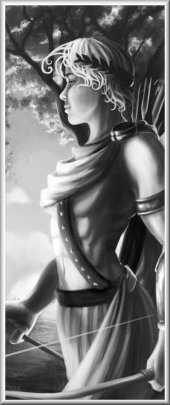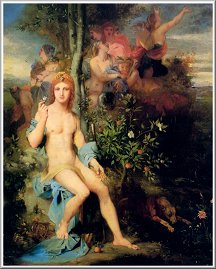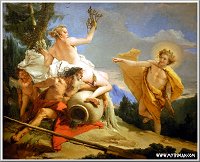
APOLLO By ALYANA

APOLLO
by Gustave Moreau
CLICK TO ENLARGE

APOLLO PURSUING DAPHNE
by Tiepolo, 1755
CLICK TO
ENLARGE
|
APOLLO PAGE THREE
continued from
page two
Apollo is usually shown as a manly, beardless youth of great
beauty, his head crowned with laurel leaves, either the bow or
his lyre in his hand. His tree was the laurel (read the story of
Apollo and Daphne below to find out why.)
Many creatures were sacred to him, chief among them the dolphin
and the crow. One of the Seven Wonders of the ancient world, the
Colossus of Rhodes, was actually a statue of Apollo (or Helios).
The people of Rhodes were particularly fond of him and every
year the Rhodians threw into the sea a chariot and four horses
for the use of the Sun, apparently supposing that after riding a
whole year across the sky his old chariot and horses must be
quite worn out.
The ancient writer Pindar calls Rhodes the Bride of the Sun,
because it was the great seat of the worship of the Sun in
ancient Greece. A Rhodian inscription of about 220 B.C. records
public prayers offered by the priests "to the Sun and Rhodos and
all the other gods and goddesses and founders and heroes who
have the city and the land of the Rhodians in their keeping."
Many festivals were held in his honor, the most famous of which
were the Pythian Games, celebrated at Delphi every three years.

Here's the story of Apollo and Daphne,
in the immortal words of Thomas Bullfinch
Daphne was Apollo's first love. It was not brought about by
accident, but by the malice of Cupid (Eros). Apollo saw the boy
playing with his bow and arrows; and being himself elated with
his recent victory over Python, he said to him,
"What have you to do with warlike weapons, saucy boy? Leave them
for hands worthy of them, Behold the conquest I have won by
means of them over the vast serpent who stretched his poisonous
body over acres of the plain! Be content with your torch, child,
and kindle up your flames, as you call them, where you will, but
presume not to meddle with my weapons."
Venus's boy heard these words, and rejoined, "Your arrows may
strike all things else, Apollo, but mine shall strike you." So
saying, he took his stand on a rock of Parnassus, and drew from
his quiver two arrows of different workmanship, one to excite
love, the other to repel it. The former was of gold and ship
pointed, the latter blunt and tipped with lead.
With the leaden shaft he struck the nymph Daphne, the daughter
of the river god Peneus [a river in Thessaly], and with the
golden one Apollo, through the heart. Forthwith the god was
seized with love for the maiden, and she abhorred the thought of
loving. Her delight was in woodland sports and in the spoils of
the chase. lovers sought her, but she spurned them all, ranging
the woods, and taking no thought of Cupid nor of Hymen.
Her father often said to her, "Daughter, you owe me a
son-in-law; you owe me grandchildren." She, hating the thought
of marriage as a crime, with her beautiful face tinged all over
with blushes, threw her arms around her father's neck, and said,
"Dearest father, grant me this favour, that I may always remain
unmarried, like Diana (Artemis)."
He consented, but at the same time said, "Your own face will
forbid it." Apollo loved her, and longed to obtain her; and he
who gives oracles to all the world was not wise enough to look
into his own fortunes. He saw her hair flung loose over her
shoulders, and said, "If so charming, in disorder, what would it
be if arranged?" He saw her eyes bright as stars; he saw her
lips, and was not satisfied with only seeing them.
He admired her hands and arms, naked to the shoulder, and
whatever was hidden from view he imagined more beautiful still.
He followed her; she fled, swifter than the wind, and delayed
not a moment at his entreaties.
"Stay," said he, "daughter of Peneus; I am not a foe. Do not fly
me as a lamb flies the wolf, or a dove the hawk. It is for love
I pursue you. You make me miserable, for fear you should fall
and hurt yourself on these stones, and I should be the cause.
Pray run slower, and I will follow slower. I am no clown, no
rude peasant. Jupiter (Zeus) is my father, and I am lord of
Delphos and Tenedos, and know all things, present and future. I
am the god of song and the lyre . My arrows fly true to the
mark; but, alas! an arrow more fatal than mine has pierced my
heart! I am the god of medicine, and know the virtues of all
healing plants. Alas! I suffer a malady that no balm can cure!"
APOLLO CONCLUDES ON PAGE
FOUR
WILL THE GOD OF LIGHT GET DAPHNE?
CLICK HERE!

|







